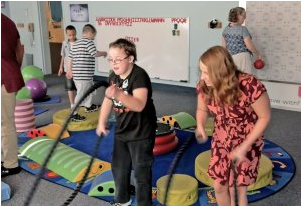 A few years ago, Mitchell Robins wasn’t able to tell anyone precisely what he was thinking. He lost the ability to speak when he was 4 and relied primarily on a system of pictures and limited sign language to tell his parents and caregivers what he wanted to eat or when he felt sick or how he wanted to spend his time. Then his parents realized he could spell.
A few years ago, Mitchell Robins wasn’t able to tell anyone precisely what he was thinking. He lost the ability to speak when he was 4 and relied primarily on a system of pictures and limited sign language to tell his parents and caregivers what he wanted to eat or when he felt sick or how he wanted to spend his time. Then his parents realized he could spell.
Now Mitchell, 17, communicates deliberately, pointing letter by letter to a board that displays the alphabet. Ask him a question and his expression will flit between deep concentration and a jovial grin as he slowly spells his answer. Mitchell, who has autism and is nonverbal, said using spelling-based communication has changed his life.
“It changed everything because I could get my wants and needs met,” he spelled during a recent interview at his home in Highland Park, Illinois.
He was able to tell his parents that he wanted to start taking classes at the local high school and meet with friends at a coffee shop, where they talk about normal teenager things. Realizing he understood much more than they had ever thought, his mom said they went from reading him Dr. Seuss to Harry Potter “basically overnight.”
In March, he started a blog about his life. By telling his story, Mitchell hopes to show the world that those who communicate differently shouldn’t be underestimated. He already has readers from nearly every continent.
Around seven years ago, Mitchell’s mother, Susan Robins, attended a presentation about a therapy called Rapid Prompting Method, which teaches nonverbal individuals to communicate by spelling. The therapy teaches students to answer fact-based and yes-or-no questions on a plastic alphabet stencil board before building up to open-ended questions on a flat paperlike letterboard, Robins said. Eventually, many spellers transition to independent spelling on an iPad keyboard or computer keyboard.
She was skeptical. In previous therapies, Mitchell hadn’t been able to select from a set of cards which one showed a happy face. It didn’t take long for her to realize that Mitchell had been absorbing the world around him by reading street signs and books and even listening to his dad help his sister with algebra homework. He understood everything, he just didn’t have a way to tell them, she said.
There has been little research to back up anecdotal success stories for this type of therapy, but that doesn’t matter to Susan Robins after seeing the difference it’s made in her son’s life.
Mitchell said he blogs to help families of other nonverbal autistic people understand their capabilities. In a recent post, he wrote about the frustration he feels when people talk down to him because they assume he can’t understand what they’re saying.
Sometimes readers leave messages asking about the therapy and encouraging him to keep writing in the comment section of the blog. Mitchell said reaching people feels “amazing because I am making a difference.”
“I think people need to stop underestimating us because our perspective is as important as everyone else’s,” Mitchell spelled. “We are intelligent and amazing people who deserve the benefits of open communication.”
Excerpted from “17-year-old Highland Park boy with nonverbal autism blogs to reach others like him: ‘People need to stop underestimating us’” in the Chicago Tribune. Read the full article.
Source: Chicago Tribune | 17-year-old Highland Park boy with nonverbal autism blogs to reach others like him: ‘People need to stop underestimating us’, https://www.chicagotribune.com/news/breaking/ct-teen-nonverbal-autism-spelling-blog-20200103-bhk5zwz35rbm5k4mkkwih4lxem-story.html | Copyright © 2020 Tribune Publishing Company, LLC
To schedule an evaluation or to get advice about your child’s challenges, call or email a CHC Care Coordinator at 650.688.3625 or careteam@stage.chconline.org





